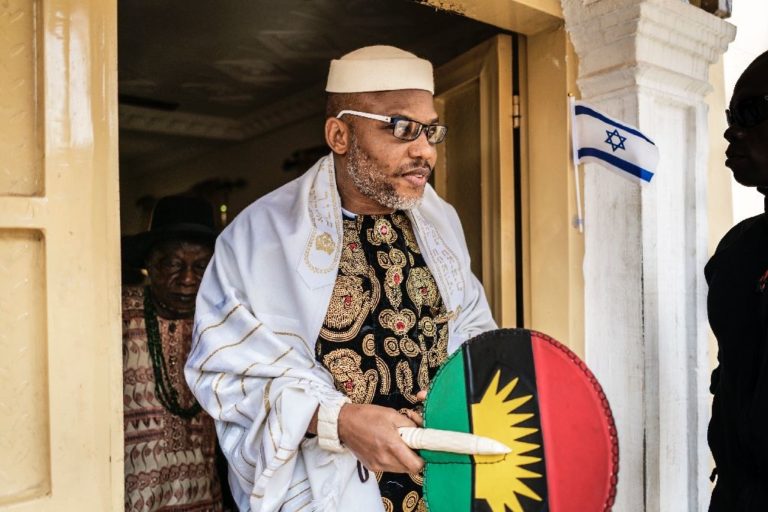
The leader of the proscribed Indigenous People of Biafra (IPOB), Nnamdi Kanu, on Wednesday indicated his interest in exploring an out-of-court settlement in his terrorism trial.
Mr Kanu’s lead counsel, Aloy Ejimakor, told Justice Binta Nyako of the Abuja Division of the Federal High Court upon resumed trial.
Mr Ejimakor told the court that he had discussed the matter with the lawyer of the attorney general of the federation, Adegboyega Awomolo, on the last adjourned date.
However, Mr Awomolo said that although Mr Ejimakor had discussed the issue, he had told him to approach the AGF, who could initiate the idea.
“I have not been instructed or authorised to do so,” said Mr Awomolo,
When the matter was called earlier, Mr Awomolo informed the court that it was scheduled for trial.
He said he was ready to proceed as their witnesses were in court.
Mr Ejimakor then informed the court that he had two applications before the court.
The lawyer said one was Form 49 application seeking the committal of the director-general of the State Security Service to prison for alleged disobedience to court orders.
He said the second was the application challenging the court’s jurisdiction. He said the SSS had not fully complied with the court’s orders as their visit to Mr Kanu was still being bugged.
However, Mr Ejimakor said that during their last visit to Mr Kanu on Monday, the security agency treated them considerably better.
He said he and his colleagues were granted access to the facility and given papers to take notes.
The lawyer, however, insisted that the service had not obeyed the order directing them to give Mr Kanu a “safe room,” to meet with his lawyers.
Mr Ejimakor expressed concern that the room the DSS gave them to meet with their “client is bugged.”
Therefore, he urged the court to invoke section 17 of the Federal High Court Act, which, he said, provides for “reconciliation” and facilitation of amicable settlements in criminal or civil matters.
He claimed that he had discussed the proposition with Awomolo on the last adjourned date and that the senior lawyer told him the proper time for such an issue had not come.
Responding, Mr Awomolo said his client did not instruct him to negotiate with the defendant over the charge. He said that, as a legal practitioner, he was only briefed on how to prosecute the matter.
“I told him to go to the AGF who has the power,” he said.
However, the trial judge, who observed that the court had no problem with exploring an out-of-court settlement if the parties decided to do so, urged Kanu to approach the AGF, who is the proper person to negotiate with.
The judge held that the Form 49 application filed by Mr Kanu was not before her. She said the matter would be looked into when brought before her.
The judge, however, ordered the SSS to provide an “unbugged space” for Mr Kanu to meet with his lawyers each time they were at the facility to prepare for his defence.
She said the unbugged space could be a garden within the SSS premises, where Mr Kanu and his lawyers could discuss the matter without the SSS operatives interfering.
Meanwhile, the judge dismissed a fresh application by Mr Kanu challenging the court’s jurisdiction to entertain counts one to five, eight, and 15 as unconstitutional.
The judge held that she could not overrule herself on issues she had already resolved, adding that the only option for the applicant was to proceed on appeal.
The judge equally ordered the prosecution to file and serve its proof of evidence on the defendant while the defendant should file his defence pending the next adjourned date.
She ordered that the defendant agree with the prosecution where there are no issues and state his objection where necessary.
In the fresh application, Mr Kanu, through his lawyer, had urged the court to quash the charges as unconstitutional. He argued that in five counts, the prosecution failed to indicate the exact location where Kanu’s alleged offensive broadcast occurred.
He had argued that the court lacked jurisdiction since the prosecution failed to show in the charge whether the alleged offensive broadcast was a punishable offence in Kenya or Britain, the two places where Kanu had been outside Nigeria before his rearrest.
The judge adjourned the matter until September 24 for further hearing.
The IPOB leader had been in the custody of the SSS since 2021, when he was rearrested and brought back to continue his trial on allegedly treasonable felony and terrorism charges.
On May 20, the court refused to release him from custody on the grounds that the DSS is the proper place for the defendant to be while the trial lasts.
The court, which declined Kanu’s application, ordered the DSS to grant Kanu unfettered access to his lawyers and fixed a trial for Wednesday.
NAN